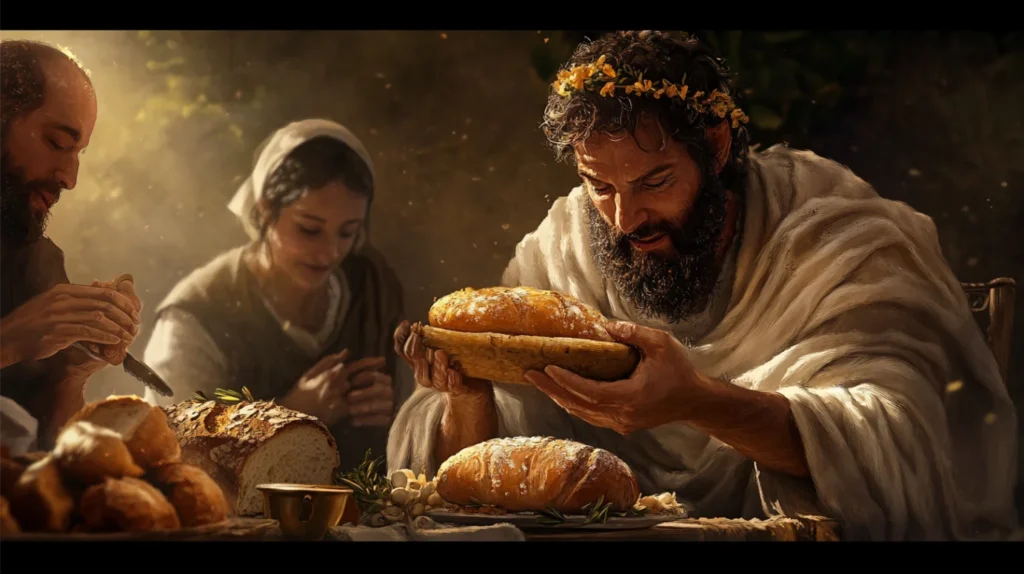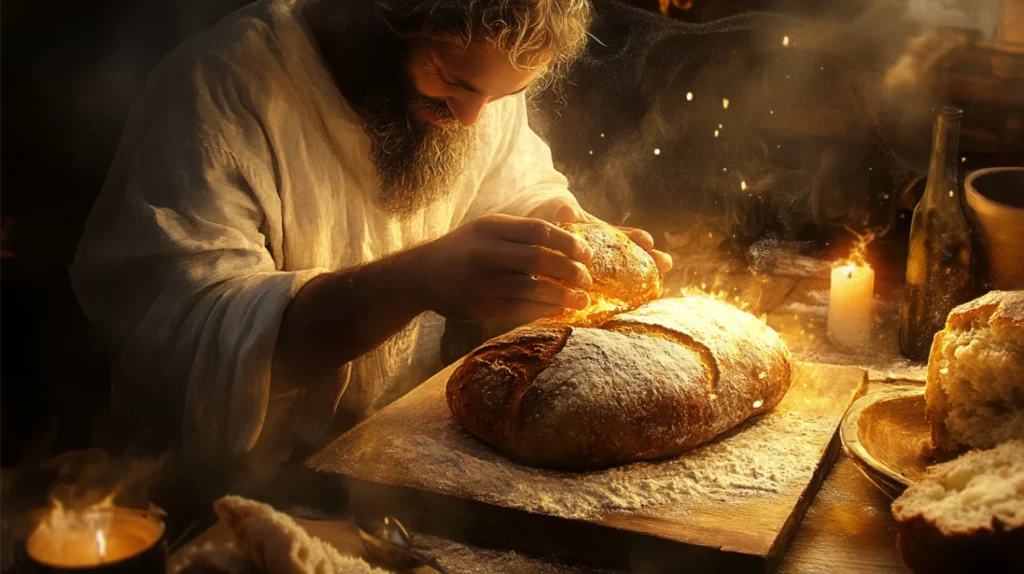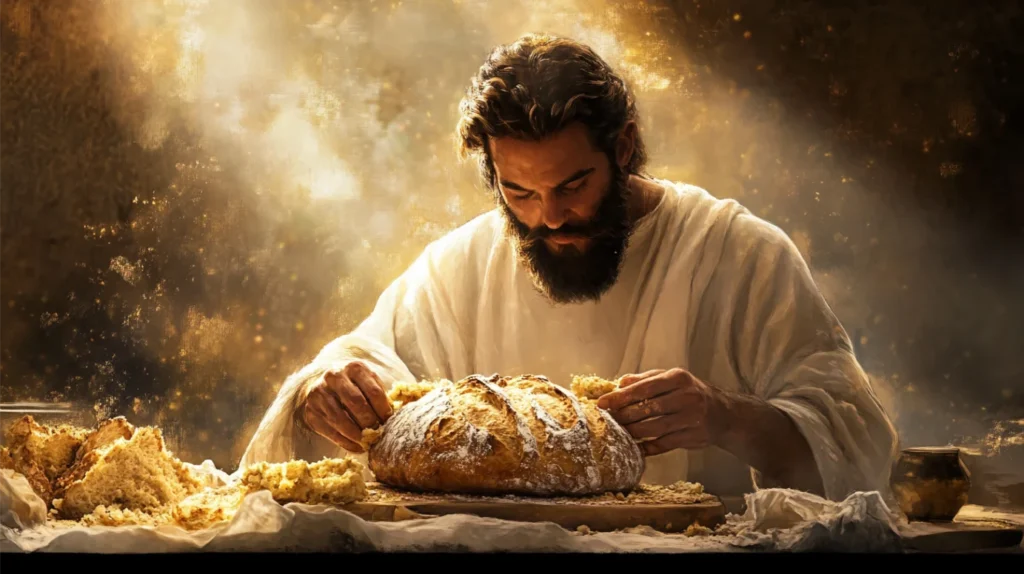
Have you ever wondered why breaking bread together feels so special? It’s more than just satisfying hunger. The act of sharing a meal has deep spiritual roots that stretch back through human history. From ancient rituals to modern dinner tables, breaking bread connects us in profound ways.
In this post, we’ll explore the rich spiritual meaning behind breaking bread. We’ll look at how this simple act nourishes not just our bodies, but our souls and communities too. Whether you’re spiritual or not, understanding the significance of breaking bread can add new depth to your meals and relationships.
Key Takeaways:
- Breaking bread symbolizes unity, trust, and shared humanity
- Many religions and cultures have sacred traditions around shared meals
- The act of breaking bread together can foster healing and reconciliation
- Mindful eating and sharing food can be a form of spiritual practice
- Breaking bread builds stronger communities and social bonds
The Ancient Origins of Breaking Bread
The tradition of breaking bread goes back to the dawn of human civilization. As early humans gathered around fires to share food, they forged bonds that went beyond mere survival. The simple act of dividing and distributing bread became a powerful symbol of trust and community.
In many ancient cultures, bread was seen as a divine gift. The Egyptians believed the god Osiris taught humans to make bread. For the Greeks, Demeter was the goddess of grain and agriculture. By sharing bread, people expressed gratitude to the gods and affirmed their connection to each other and the earth.
Breaking Bread in Religious Traditions

Many of the world’s religions have sacred rituals and teachings centered on breaking bread:
Christianity
In Christianity, breaking bread holds profound spiritual significance. It recalls the Last Supper, where Jesus broke bread with his disciples. The Eucharist or Communion ritual, where bread is blessed and shared, is a cornerstone of Christian worship. It symbolizes Christ’s body and the unity of believers.
Judaism
The Jewish Sabbath meal begins with the breaking of challah bread. This braided loaf represents the manna God provided to sustain the Israelites in the desert. Breaking and sharing the challah connects modern Jews to their ancestors and to each other.
Islam
While not specifically “breaking bread,” the Islamic tradition of iftar – the meal that breaks the Ramadan fast – carries similar spiritual weight. Sharing food after a day of fasting reinforces community bonds and spiritual reflection.
Hinduism and Buddhism
In these Eastern traditions, the offering and sharing of food (prasad in Hinduism, tsog in Tibetan Buddhism) is a vital part of worship. It represents the cycle of giving and receiving between humans and the divine.
The Social Power of Breaking Bread

Beyond religious contexts, the act of breaking bread together has immense social and psychological impact. When we share a meal, we drop our guards and open ourselves to genuine connection. There’s a reason why so many important conversations happen over dinner!
Breaking bread creates a sense of equality. When everyone at the table receives a portion of the same loaf, it reinforces our shared humanity. This is why bread-breaking rituals have been used to seal peace treaties and resolve conflicts throughout history.
In many cultures, offering bread and salt to a guest is a sign of welcome and protection. This tradition recognizes the sacred nature of hospitality and the transformative power of sharing food.
Table: Cultural Bread-Breaking Traditions
| Culture | Tradition | Significance |
|---|---|---|
| Greek | Breaking of vasilopita (New Year’s cake) | Blessings for the coming year |
| Native American | Sharing of fry bread | Community bonding, cultural resilience |
| Ethiopian | Gursha (hand-feeding others) | Expressing love and trust |
| Russian | Offering bread and salt | Welcome and hospitality |
| Mexican | Breaking of Rosca de Reyes | Celebration of Epiphany |
The Healing Power of Shared Meals
There’s growing recognition of the therapeutic potential of breaking bread together. Family therapists often use shared meals as a tool for improving communication and resolving conflicts. Addiction recovery programs frequently incorporate communal meals to foster support and belonging.
The simple act of preparing and sharing food can be deeply healing. It allows us to nurture others and be nurtured in return. In times of grief or hardship, the offering of a meal is a tangible expression of care and support.
Mindful Eating as Spiritual Practice
In our fast-paced world, meals are often rushed and solitary affairs. But embracing the spiritual dimension of breaking bread invites us to slow down and be present. Mindful eating – paying full attention to the experience of our food – can become a form of meditation or prayer.
Consider these questions next time you break bread:
- Who grew and prepared this food?
- How does this meal connect me to the earth and to others?
- What am I grateful for in this moment?
By approaching our meals with intention and gratitude, we transform the ordinary into the sacred.
Building Community Through Food

Breaking bread is a powerful tool for building and strengthening communities. Community gardens, potlucks, and soup kitchens all use the sharing of food to bring people together across differences.
In an age of increasing isolation, intentionally gathering to share meals can be revolutionary. It creates space for real conversation, laughter, and the kind of connections we all crave.
Some ideas for fostering community through breaking bread:
- Start a dinner club with neighbors or friends
- Volunteer at a local community kitchen
- Host an international potluck to celebrate diversity
- Organize a block party centered around food sharing
The Environmental Impact of Our “Daily Bread”
As we consider the spiritual significance of breaking bread, it’s important to also reflect on the broader impact of our food choices. The way we grow, distribute, and consume bread (and all food) has profound implications for the health of our planet.
Choosing locally-sourced, sustainably-produced bread is one way to honor the sacred nature of our daily bread. Supporting small-scale bakeries and farmers markets not only provides fresher, healthier bread but also strengthens local food systems and communities.
Bread as a Metaphor for Life
The process of making bread – mixing, kneading, rising, baking – offers rich metaphors for our spiritual journeys. Like dough, we need time to “rise” and transform. Sometimes life “kneads” us roughly, but this can lead to growth and new strength.
What spiritual lessons can you draw from the bread-making process? How might viewing your life through this lens offer new insights or perspectives?
Digital Age: Virtual Bread-Breaking
In our increasingly digital world, we’re finding new ways to “break bread” across distances. Virtual dinner parties, online cooking classes, and food-focused social media all attempt to recreate the connective power of shared meals.
While these can’t fully replace in-person gatherings, they offer valuable ways to maintain connections and create community. How might you use technology to foster meaningful “bread-breaking” experiences in your life?
Conclusion: Nourishing Body and Soul
The spiritual meaning of breaking bread reminds us that eating is about more than just fueling our bodies. It’s an opportunity to connect, to reflect, and to nourish our souls. By approaching our meals with intention and openness, we tap into an ancient wellspring of human connection and spiritual significance.
Next time you sit down to a meal, take a moment to pause. Break your bread mindfully, whether alone or with others. Let it remind you of your connection to the earth, to those who came before, and to the web of humanity we’re all part of. In doing so, you’ll transform a simple meal into a sacred act of breaking bread.





